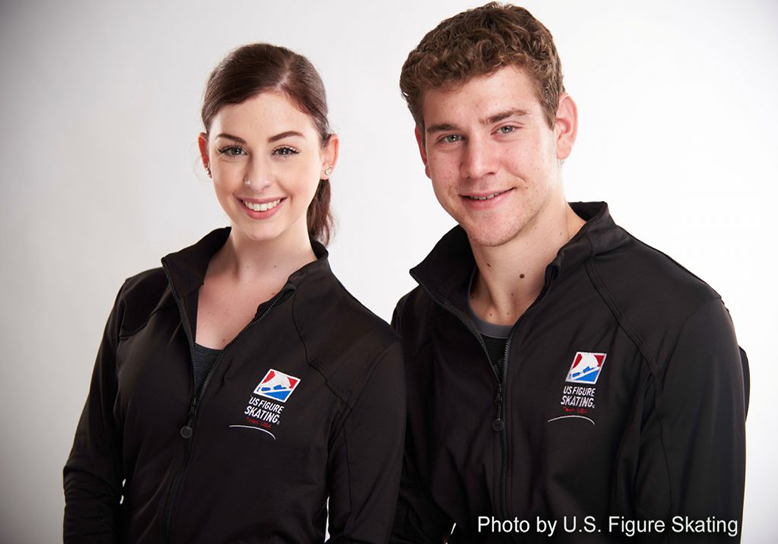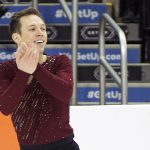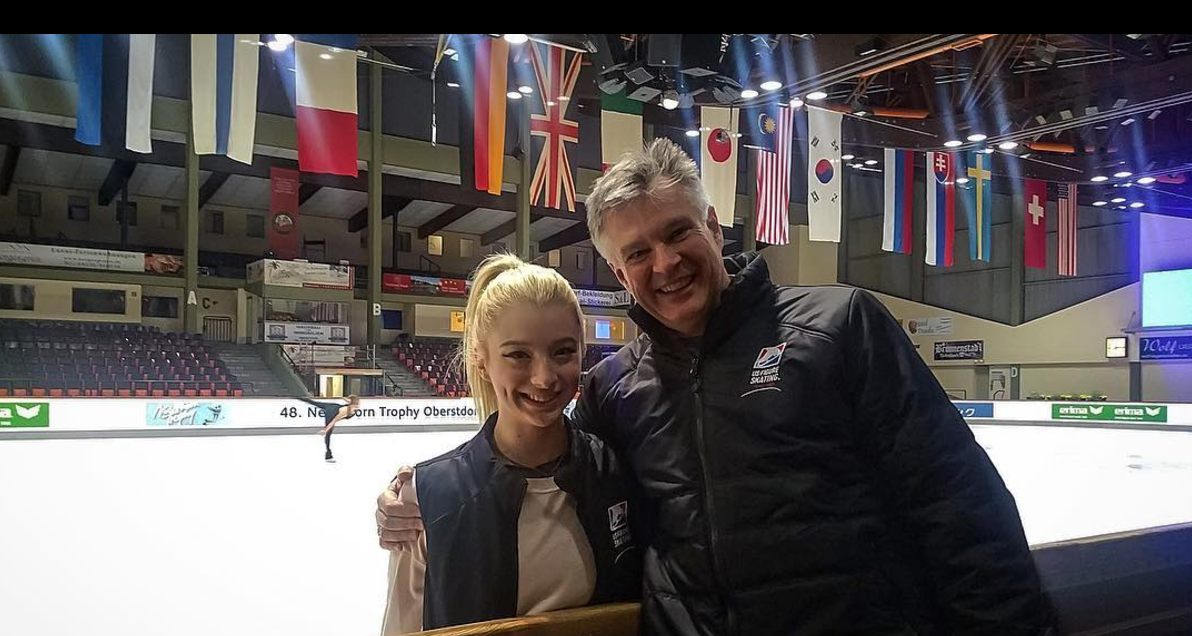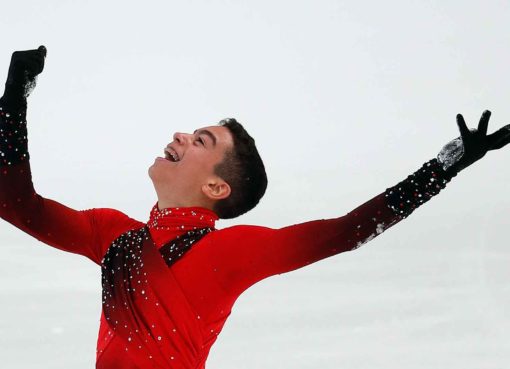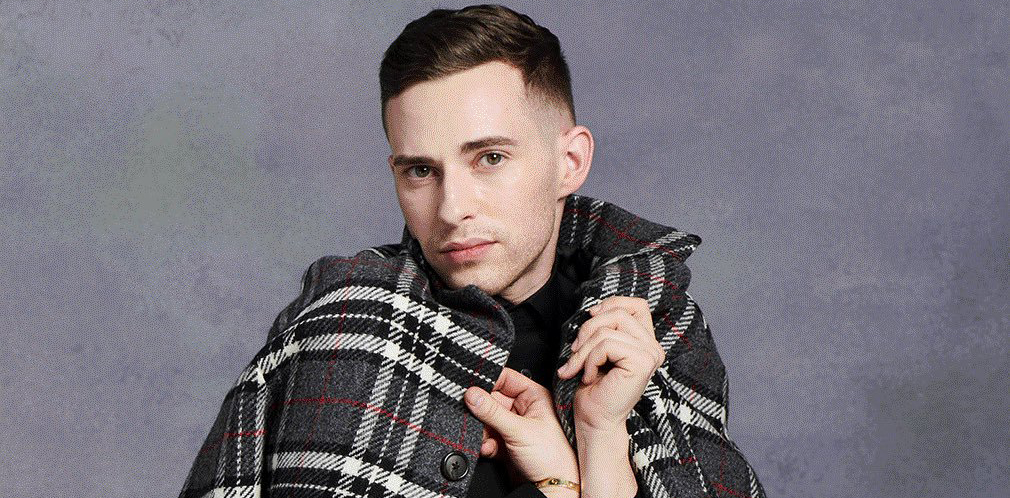By Claire Cloutier, special to Figure Skaters Online
Claire Cloutier, of A Divine Sport blog and a special contributor for Figure Skaters Online, talked with 2017 U.S. champions Haven Denney and Brandon Frazier about the highs and lows of this past year and their plans for the 2017-18 season.
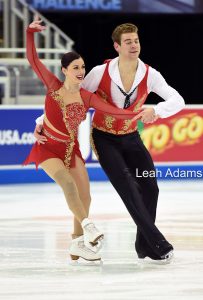 Last year was a comeback season for Haven Denney and Brandon Frazier. After missing the entire 2015-16 season due to injury, they were looking to reestablish themselves among the top pairs teams in the United States and internationally. And, in many ways, they succeeded, winning a silver medal at 2016 Skate America and the 2017 U.S. National title. However, their season came to an unfortunate end at the 2017 World Championships in Helsinki, Finland, where they had a mistake-ridden short program and failed to qualify for the long program.
Last year was a comeback season for Haven Denney and Brandon Frazier. After missing the entire 2015-16 season due to injury, they were looking to reestablish themselves among the top pairs teams in the United States and internationally. And, in many ways, they succeeded, winning a silver medal at 2016 Skate America and the 2017 U.S. National title. However, their season came to an unfortunate end at the 2017 World Championships in Helsinki, Finland, where they had a mistake-ridden short program and failed to qualify for the long program.
It wasn’t easy for Denney and Frazier to come to terms with the events of last season–especially the disappointment at Worlds. In truth, it has been a long and difficult road back since Denney’s knee injury in April 2015.
“I think Haven and I can both agree that [last] season was probably the toughest season of our lives,” Frazier admitted, as he discussed the past year. “It was not easy. A lot of people came up to us and congratulated us on the good moments. But, it was a struggle and a fight all the way to the end of Worlds for us. I am very proud of Haven. She went through a career-ending injury that she turned into a comeback. And it was amazing to watch. But we both struggled, and it was very challenging.”
After her injury, Denney was not cleared to start difficult jumps until January 2016; the team started competition just six months later, in early July 2016.
“We never had that off-season,” said Frazier. “Our off-season [last year] was trying to get our elements back to competition-readiness. And, even when we were still struggling with that, it was time to compete. And the competitions just rolled, one after another. We had a long season. We started at Skate Milwaukee. And we went to Skate Detroit, Champs Camp, Bratislava [Ondrej Nepela Memorial], Skate America, Skate Canada, Croatia [Golden Spin of Zagreb]. And then Nationals, Four Continents, and Worlds. It felt like a marathon … it was definitely a game of catch-up, all the way through.”
His partner agreed. “Trying to get all of our elements back to 100%, while doing it in front of a huge crowd, and competing with it ….” Denney’s voice trailed off.
Frazier explained: “A lot of the things that we did very well a few years back became very hard for us. And the things that were complicated for us in the past became even more complicated. There were some good days. Days when we were like, ‘Yeah, we’re getting definitely back under our feet.’ And there were a lot of days where we felt like we were never going to see that finish line of coming back. Everyone told us it was going to be super-hard; not just getting back in shape, but doing a full season. [But] Haven and I didn’t really expect that kind of heaviness—pressure. We did get a surprising result at Skate America, and that was absolutely nice. But it was a very emotional season for us. A lot of ups, and a lot of downs. You know, we smiled on the podium. But inside, it was a fight. It was a constant fight, for sure.”
Still, the team felt they were making progress through the season. “After Nationals, our training started to progress,” said Frazier. They also started working with Alex Ouriashev–former coach of Gracie Gold and a highly regarded jump technician–to help improve their side-by-side jumps.
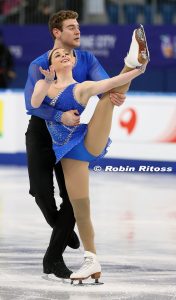
Going into Worlds in Helsinki, Finland, Denney and Frazier felt the most prepared that they had all season.
“We were feeling very confident,” said Frazier. “Honestly, the practices in Finland were going great.”
“Yes, we were skating actually the best we were all season,” agreed Denney.
So the team’s performance was an unpleasant surprise: two falls and a spin mistake, resulting in their lowest short program score of the season. They placed 20th. The top sixteen teams qualify for the free skate.
Frazier said: “It felt like a bad dream. You know, every skater has that bad dream of a program going wrong. And that became reality.”
Denney fell on a throw triple loop in the beginning of the program. “And once we made the first error, there was definitely a little bit of distraction,” Frazier said. “Then when the second error hit, that’s when you know—this was not our night. I can’t really explain it. It was a very, very bad evening for me. Once the [first] mistake happened, I got that ‘deer-in-the-headlights’ [feeling]–I’m very disappointed about that, in myself. I made a lot of technical errors. At the worst possible 2 minutes and 50 seconds of the season. And of course, the cost of it … It had consequences, for sure. It’s a program I won’t ever go back and watch.”
“It was a shock,” concurred Denney. She described feeling stunned after the program. “We were like—’Can we just re-do that?’ It was a definitely a learning experience. A hard one.”
But although the season ended on a tough note, Denney and Frazier don’t want to lose sight of their achievement coming back from her knee injury. Frazier commented: “I will never let that one performance cloud what Haven and I did last season, in the sense of [the comeback]. Haven did an amazing job with that injury. I don’t think a lot of people truly know how bad it was. And I won’t let one horrible short program get in the way of what she accomplished. So as long as our federation isn’t ready to give up on us, we’re both 100% committed.”
The team was very grateful for the support they received from U.S. Figure Skating after Worlds. “We were there for four more days in Finland [after the short program], and I was feeling very low, and our team leaders were very supportive,” said Frazier. “I don’t think we could have made it through without that. Mitch Moyer [USFS Senior Director of High Performance] sat and talked with us. And all he cared about was getting a good plan that’s going to work for us next year. There was no pointing the fingers …. it was just reevaluating what we could build. And when we got home, we got on meetings and phone calls with them, and it was like: ‘Hey, guys, we know you can do this. Let’s talk about what tools you will need.’ So it was great and very encouraging to hear that.”
After much reflection, Denney and Frazier are ready to put last year’s disappointment behind them and focus on the new season to come.
“We’re happy that we have an off-season [now] to actually train, and work, without the pressure of being in competition,” said Denney.
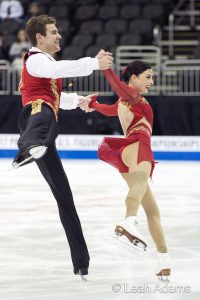
“It was nice to–when we got back to work–not have to re-learn a throw, or re-learn the timing of a twist,” agreed Frazier. “When Haven and I got back [from Worlds], it took a while to bounce back, obviously. But after some time passed, and some planning with the coaches and the federation–we went right to work. And we haven’t wasted a day. I think we’re in the exact spot we want to be, now. We feel very happy, where we are with our training.”
In June, the duo announced their new free skate to Queen’s “Who Wants to Live Forever.” This music is a bit of a departure for the team, who have typically skated to classical music or movie scores. I asked how they chose the Queen song.
Denney and Frazier said they considered many different options before deciding they wanted to go in a modern direction. Coach Rockne Brubaker “wanted us to skate to a more rock ‘n roll style,” said Frazier. “He thinks we look good with that. And we were talking about “Stairway to Heaven” for a while. It was Haven who brought in this piece. And, listening to it, I really liked it. Then we sent it to Marina Zoueva, our choreographer. She loved it. We had one of our music guys do an edit, and alter it a bit. I think it’s going to be a very powerful free skate for us. There is nothing we’ve found of it being negative, so far. And I love training it–it’s fun. I think it’s going to launch us more to our full potential this year.”
Denney explained that the long program “goes back and forth between the [Queen] vocals and [German violinist] David Garrett’s version of it. So it’s rock, but it has some classical sections in there as well. It’s a good mix. It’s very skateable.”
“I think the main thing is, Haven and I just enjoy doing it,” said Frazier. “And I think that’s going to help the skating, in the competitions.”
Denney and Frazier are putting a special focus on their short program this season. The team has chosen their music and are working on the program. However, they intend to keep it under wraps until Champs Camp [Aug. 19-23], where they will get feedback from judges and federation officials.
“We’re really putting a lot of time into the short program this year,” said Frazier. “Our free skates have always been our strength. So we’re trying to make the short [program] a huge strength for us.”
The team said they typically prefer skating long programs to short programs. “For some reason, Brandon and I just love doing our long programs better,” said Denney. She laughed. “It’s weird, but–”
Frazier jumped in: “If you ask us, on a training day, which program would you prefer to run, we’re going to tell you the free program. And I think it’s just because we like the length of the program, the time in between the elements. Sometimes we kind of take that attack off the short [program] a little bit, and we put too much emphasis on the free program. So we want to balance it a little more. And get in a great position with the short [program], for the long program.”
Frazier feels that, in the past, the team tended to pick stronger pieces of music for their long programs. “We’ve had this thing for our free skate for years now. La Strada (2012-13) was a great, strong free program that we loved. And the short [program]–sometimes when we train it, we’re just doing it to get the repetition in. I remember our Lion King year (2014-15). I loved The Lion King. We always loved doing that free program. And we did The Godfather for the short [that year], and we liked The Godfather, and it was fine for us. But every time it was a short [program] day, I would be like, ‘Okay, let’s get the short done, so we can move to the long, or long sections.’ We need to treat the short as powerful as the long.”
Denney added: “For me personally, I feel … In competition, doing a long [program] is sometimes easier. Because it’s after the short [program]. And you’ve already got that feeling of competing.”
Frazier said the team is paying closer attention to their music this year, trying to cut the music for maximum impact. “We really want to make it like: This is it. This is our Olympic short program.” The team will announce their short program music following Champs Camp.
Artistically, the team’s main goal this season is to improve their connection and chemistry on the ice. One key to that? “Eye contact with each other,” said Frazier. The team has been told that they do a good job making eye contact with the judges, but less so with each other. “Rockne and Marina, they always tell me: ‘Dude, keep your eyes on her. If it’s not on the judges, it’s on her.’ I have a knack of looking down on the ice, I don’t know why.” He laughed. “But, trying to—from the minute the program starts, to the minute the music ends, or even when we get off the ice–just constantly staying connected with each other. Not losing that. The minute you lose it, everyone can see it. Artistically, we really want to up the components score and the presentation. We want to have a connection on the ice like no other team.”
Denney and Frazier have taken inspiration from some of the top ice dance teams, as well as other pairs, when it comes to improving their connection. “This year when I watched [Tessa] Virtue and [Scott] Moir at Four Continents—their free dance—there wasn’t a second that I was not in the performance with them,” commented Frazier. “That kind of drawing in—their connection—that’s what first woke me up a bit toward it. And that was the difference from being on top and mid-pack, right there. All of the top 10 [dance teams] in the world have that connection with each other. Even in practices, in run-throughs. They always keep the connection; from when they leave the wall, to when they come back to the wall. Marina’s working on that with us. And that’s something we definitely needed. It was a big weakness on our end.”
The duo also took inspiration from seeing the free skate of Wenjing Sui and Cong Han live at Worlds in Helsinki. “There’s a reason why they’re the World champions,” said Frazier. “Their connection … It’s like: ‘What discipline are you? Are you ice dance, or pairs?’ The way they skate in between the elements—the way they look at each other. So, it’s taking things from that, and trying to incorporate it.”
In addition to connection and chemistry, Denney and Frazier have been working on skating skills, extension, and body movement with Jamie Whyte, a former British ice dancer and coach at their training facility. Denney cited several areas she’s been working on: “Finishing my movements can be better. Instead of doing a move and going right to something else, really extending and finishing it off. And more power and speed.”
“I hate watching myself skate. I absolutely do,” admitted Frazier. “But this off-season, I really buckled down and studied what we’re lacking.” The team watched videos of their performances to determine where they can improve: “Keeping shoulders down when we get tired, and having really smooth skating skills. Doing everything at its highest level, with our hardest tricks, [while] keeping that connection.”
Denney and Frazier are also working to improve their technical elements. Last season, their side-by-side jumps were inconsistent–which they felt was partly due to lack of practice time, after Denney’s injury. Frazier explained that it was challenging having to run programs with jumps that didn’t feel quite ready yet. The team is glad to have the opportunity to do more intensive work on their jumps during the off-season. “Having three months without having to run a program [helps],” said Frazier.
The team has continued to train with Alex Ouriashev two to three times per week. They feel that Ouriashev has definitely helped their confidence, as well as their technique.
“The confidence comes from the amount of jumps we do,” said Frazier. “And he jumps you. You turn into a singles skater when you work with him. I love it; you definitely do things you don’t do in everyday pairs skating practice. He works technique, but he keeps you moving. It’s not like you’re on the wall, working for 10 minutes, and then you go try one. I’ll jump like 40 to 50 jumps in a half hour, with him.”
“Just repetition,” Denney agreed. “And when something gets easy, then he’ll make it–”
“—Harder,” laughed Frazier. “He had me, at one point, looking at the ceiling and spinning really fast and getting completely dizzy and then going [to] do the jumps. Things like that. He made us do hand-in-hand crossovers, like 5 full laps, and then go and do the jumps.”
“It’s so smart, though,” said Denney. “Because you’re not going to be fresh at every spot in your program.”
Ouriashev challenges the team, but also knows when to dial things back and not overwhelm them. “Especially when we start new things and are making more mistakes, he’s very good at saying, ‘Okay, we’re done here, let’s move on.’ And then, there are days where he’ll push you through it. But when you finally get off the ice, [you] know that you made the correction you needed to make. He never leaves you disappointed, or down, or, ‘Hey, I fell 30 times’. I don’t think Haven and I have really had a bad lesson with Alex. There’s obviously days when things are tough, and–”
“–And it’s not working, and we’ll do an exercise for it,” said Denney. “And then, do it again. And then an exercise, and then do it again. So you’re always putting the right technique in your body, and your mind, [even] if things are not going well. So whenever you get off the ice, even if it was not a great day, you always feel like it was productive, and like you’re doing the right thing for your jumps. Which helps with your confidence.”
Denney and Frazier will again do side-by-side triple Salchow-double toe loop for their jump combination in the long program. But they plan to upgrade last year’s solo double Axels in the long program to triple toe loops.
The team has also been drilling their throw jumps, which were similarly inconsistent last season. “Last year was a struggle on everything that [had been] solid for us,” Frazier said. “This off-season, our throws have been really good, and we knew they were going to come back. Our throw triple Salchow used to be our best throw, by far. Now [it’s] right back at that level, and we’re adding a nice mini-lift into it for GOE [grade of execution points]. And the throw triple loop—just getting that concreted down, so we can do it any time of the day. That’s where we’re at. We play around with the throw triple Axel and the throw triple flip, and we figure there will be a day to do that. But this season’s not the season. GOE [points] and skating as consistently as possible is our prime focus this year.”
Denney said that her knee is not affected by the strains of jumping. “My knee is doing actually really well,” she said. “I don’t have any doubt in my mind, for skating or throwing. I feel like it’s 100 percent.”
Denney and Frazier are adding several new lifts to their programs. “Lifts have been a strength for us,” commented Frazier. “And now that it’s the most important season in our career so far, we’re kind of going all in with that.”
Last season, they added an exciting new reverse lasso lift, with a one-handed hold on Haven’s thigh and a dramatic flip-out exit. (This is the only lift they’re retaining for the new season.) I asked Haven if she ever got nervous doing this challenging lift.
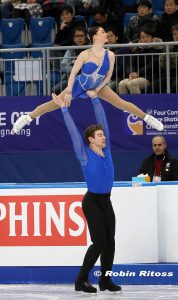 Denney laughed. “No, not really, actually. It’s definitely all where the hand is at, and the balance. Usually, if that is right, then I feel very comfortable with it. It’s actually a lot of fun. I love that lift; it’s like you’re flying.”
Denney laughed. “No, not really, actually. It’s definitely all where the hand is at, and the balance. Usually, if that is right, then I feel very comfortable with it. It’s actually a lot of fun. I love that lift; it’s like you’re flying.”
“I hated that lift when we first started it,” Frazier laughed. “I absolutely did. If the balance point was not on, then it would have to come down. [And] the way it would come down would be so hard—there was no safe way. But we never had to bring it down. And when Marina put it in the end [of their free skate], as the second-to-last element, I was like: ‘Hey thanks, Marina.’ ” He chuckled. “It took a lot of conditioning. But it was an awesome challenge, and Haven and I are happy we did it. After we did that, we knew we could really push other things.”
This spring, they worked off-ice with coaches Rockne Brubaker and Stefania Berton to create new lift concepts. “We spent hours and hours after Worlds, a whole month off-ice, just thinking of these things,” said Frazier. “All four of us. And then it’s like, okay, how do we get this on the ice, let’s train it, let’s make sure we’re safe. It was a team effort.”
The team’s triple twist has always been a strong and reliable element; before Denney’s injury, they often got level 4 on it. They scored well with their triple twist last season, but received mostly level 3s. They spent some time during the off-season to fine-tune the element in hopes of raising their levels and GOE scores.
“When Haven and I were injured, we were in Colorado Springs for about 4 months, doing twists and lifts all on our own,” said Frazier. “And I developed a bit of a bad habit, without someone watching. Some things were getting in the way of getting that full-blown, beautiful, easy, airy triple twist with level 4s. But this off-season, we went back to the drawing board. And we dissected it, broke it down, rebuilt it, added skating into it differently. And you know, we’re absolutely ready to try to make sure we’re getting level 4 consistently.”
Denney and Frazier said that the requirements for twist levels are strict. The split feature is the most difficult to get credit for, in their view. “For me, the split is the hardest part,” said Denney. “It’s that perfect timing between trying to get your split, but then being able to complete all the rotations. When we have good timing, it’s pretty easy for me to get it. It’s a lot of pop-ups, and a lot of doubles, and just trying to keep it the same [technique] for our triple, in practice.”
“I think you’ll definitely see a change in our triple twist, with a little more height and a little more clean of a catch,” said Frazier. “And I think it has gotten a little more lateral–not too much, but a noticeable amount. Everyone’s twist is different.”
Right now, some of the other U.S. pairs teams (notably, Ashley Cain and Timothy LeDuc and Deanna Stellato and Nathan Bartholomay) are working to upgrade their technical content with harder jumps. Denney and Frazier said they don’t feel pressured by this; their goal is to stay focused on their own skating.
“There will always be a team trying something new or something harder than what we’re doing,” commented Frazier. “Haven and I don’t get discouraged with things like this. It motivates us. We know what our job is, that lies ahead of us. There’s some things we have that we’re really excited to show this year. And that’s what we’re going to do. We’re very happy for all the other U.S. pairs teams. We’re always going to root for them. We support each other; we want them to succeed as much as we do. So it’s exciting to hear that they’re pushing the limits that the other world-class pairs teams are doing. But for Haven and I, we know where our strengths are, we know where our weaknesses are. And this year is going to be playing our strengths. After this [past] World Championships, we’re not really nervous any more to fail. We’re not afraid to fail. After you hit that kind of rock …. We know we’re powerful, it’s just summoning that at the right time. You know, Haven and I put a lot of pressure on ourselves last year. And we don’t want to have another season like that. We are at our best when we know things [with us] are going well, and just keep going. Don’t focus on anyone else.”
Denney and Frazier have opted to take a measured start to their season this year. They don’t plan to enter any club competitions this summer, preferring to stay focused on their preparations for Champs Camp.
“Last year, we started way too early,” said Frazier. “This year, we want to start as late as possible.” With U.S. Nationals coming early this year [ending on January 7, 2018], the team feels that their schedule this season will be compressed. Therefore, they don’t want to add any events unless necessary. As of now, they expect to compete at one Challenger Series event and their assigned Grand Prix competitions of Skate Canada and Skate America.
“We’re at some very competitive Grand Prix [events] this year,” noted Frazier. “We just want to go out there and show that we are good enough—which I know we are– to compete with those teams, and put up very respectable scores.”
After the Grand Prix, it will be time for U.S. Nationals and the Olympic team selection. With only one U.S. pairs slot available for Pyeongchang, it won’t be easy for Denney and Frazier to make the team. The couple has a clear-eyed view of the situation.
“If it doesn’t happen, it doesn’t happen,” said Frazier. “And we’re not going to make our whole career, and what the future may hold for us… be based on [if] we get that one spot. “
At the same time, there’s no doubt that Denney and Frazier plan to do everything they can to make their case for the team. “We’re not going to treat [this year’s] Nationals as any other Nationals. We’re going to go in there, and we’re going to give it everything we’ve got,” vowed Frazier. “It is no secret that Nationals has a heavier pressure on it, and that’s the deciding factor, in a lot of ways. We’ve had talks–we can go there and do well, and we may not even be chosen for that spot. But we’re not going to think about that too much. We’re just going to think about going out there. We don’t want to get off the ice knowing we’ve left something on the table.”
Although last season was challenging, Denney and Frazier are determined to press on and show how much they’ve accomplished through their work this off-season. “We want to show the judges—everyone–that we still have a lot to give,” said Frazier. “And we’re still learning and building. We want to be a big part of [the future of] U.S. Figure Skating for pairs. And we’re going to do everything we can.”


